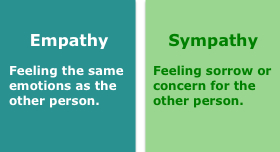I have been curious as to the way different cultures use different words and how they can mean very different things from city to city, and culture to culture. Recently I have been wrestling with the words, “empathy” and “sympathy” within a mormon-context, or Latter-day Saint informed approach to Christian discipleship. After watching videos and doing my own research I think I have come to some reasonable conclusion as to how these two words, in practice, apply to true Christian discipleship.
A Facebook posting of a video (see embedded below) is a valiant attempt to show the difference between empathy and sympathy, with an endorsement for practicing empathy. The video also addresses the impact these qualities can have on the various relationships in our lives. I would encourage you to watch this short 2:53 second video if you wish to have further context as to the rest of this article, however, I will construct my thoughts so as to not make that a pre-requisite.
Empathy: “the action of understanding, being aware of, being sensitive to, and vicariously experiencing the feelings, thoughts, and experience of another of either the past or present without having the feelings, thoughts, and experience fully communicated in an objectively explicit manner.”
Sympathy: inclination to think or feel alike; emotional or intellectual accord. the act or capacity of entering into or sharing the feelings or interests of another.
By dictionary definition, empathy and sympathy are actually quite similar, and should not be considered polar opposites. Both have a place, and can be employed in such a way to successfully build a relationship. Sympathy can be a gateway to empathy. If these emotions were like eating food, sympathy would be sitting down as a patron, ordering food off a menu, consuming it and expressing appreciation for the meal and skills of the chef; empathy would be getting in the kitchen, helping to prepare and make the food, then enjoying it with the chef.
Another way to express their difference as well as their social value is as follows: Empathy is possible when two people are open to the emotional sharing experience. This allows for two people to share the burden and feel connected through shared experience. In contrast, sympathy is more of a one way expression of the same desire to feel connected to the emotions of the other, and to do so with the intent of lifting their burden, and sharing in their experience. The goal of genuine sympathy is to promote the suffer’s emotional well being. However, where either geography, time, or reluctance on the part of the one experiencing the emotional trauma, empathy is not an option.
To use the example in the video, when an individual is experiencing a discomforting emotion, psychological trauma, or is feeling stuck or overwhelmed (in the deep dark hole), there are many ways that others can respond. To be empathetic with another in this situation, is to be willing to get down into the deep dark hole, be willing to enter the same emotions as the other individual, to not judge them but recognize their feelings as authentic to their experience; but also to express your willingness to stay there with them for as long as they need.
We often speak of empathy as something that is possessed by the person on “the outside looking in.” I suggest that a key difference between empathy and sympathy is that empathy requires the person in the hole, the person in that deep dark place, be willing to let you in to their emotional space, as well as the person getting in the hole with them. Empathy is not fully possible in isolation, but must be, in a very unique way, experienced by two people, willing to share the experience as much as is possible.
There are times where an individual very much wants to be empathetic, to share in the experience, but due to a number of circumstances is not able or permitted to do so. Empathy is a door that must be opened by the person who needs to receive it. If we seek to kick down that door in an effort to be empathetic, we have already failed. However, this does not mean that sympathy, when properly expressed, is of no value.
Sometimes the expression of sympathy will eventually open the door to empathy. In some ways, sympathy is like knocking on that door and letting someone know that you are emotionally available should they be willing to open the door and share in their experience with you. If they don’t open the door, that is their choice, and doesn’t turn that person’s sympathy into a negative.
Some have attempted to paint sympathy as some form of patronizing or looking down upon another person experiencing emotional pain, even judgmental of that individual. I find no justification or definition of sympathy that would support such a notion. At times people have expressed what may be described as a “sympathy-like” attempt on the outside, but is really that individual’s emotionally immature attempt to navigate their own discomfort at the sight of another in emotional distress. This should not be confused as genuine sympathy, as sympathy can be unifying, and can have merit in building or preserving relationships.
Empathy is the higher law; a more desirable expression of human compassion.
No empathic conversation should start with, “I know what you are feeling.” Since no two experiences and no two personal histories are exactly the same, and to say such can come off as patronizing, to start off with a comparison to another’s experience is turning the conversation to ourselves rather than the person suffering. Empathy is about the sharing that person’s experience, not finding common experiences. Some expression of willingness to understand what they other person is feeling is requisite, but it does not imply a need to connect their experience to our own for empathy to take place. Because of this, empathy for a stranger is not easy, if not unlikely as there has not been the necessary time in place to build trust that would make true empathy effectual. While not impossible, empathy is typically experienced by those for whom there is trust, for whom there is a willingness to go to into the hole.
With respect to discipleship, I see Jesus Christ as the embodiment of both empathy and sympathy. His sympathy that leads to empathy is described perfectly in Revelation 3:20, “Behold, I stand at the door, and knock: if any man hear my voice, and open the door, I will come into him, and sup with him, and he with me.” The atonement is divine empathy on an eternal scale. We are therefore encouraged to be like Christ as much as is possible, to take part in his work and glory to bring to pass the eternal life of all his children–to be a disciple is to be sympathetic to all, and empathic to those who will open up to such an experience.
While some may not agree with the “Websters-Dictionary-Definition” of these two words, or assume something very different about them, the reality is that feelings of compassion for one another should not be discouraged. Wether an individual chooses to allow for empathy or if they simply recognize your expressions of judgement-free concern (sympathy), both have value and should not be discouraged by either side of an emotional trauma or episode. As Camilla Kimball once stated, “never suppress a generous thought.” Sympathy, and most surely, empathy, are generous thoughts. To give of one’s time and emotional energy to the lifting and concern of another is a divine attribute.
Nick Galieti is an experienced podcaster as both producer/host of The Good Word Podcast, and was named the recipient of the 2015 John Taylor: Defender of the Faith Award by FairMormon for his podcasting effort with that organization. Nick is the voice of Book of Mormon Central’s “KnoWhy” podcasts. Nick has directed and produced two documentaries on the life of Joseph Smith Jr., Picturing Joseph, and Murder of the Mormon Prophet.
Nick is also a published author of the books Tree of Sacrament, and The Exaltation Equation. A past guest of The Cultural Hall (click here to listen). Nick was born in Southern California, and served a mission to the Baton Rouge, Louisiana. Nick is a freelance sound engineer of over 15 years, is married, has 5 daughters, and now lives in West Valley City, Utah.

